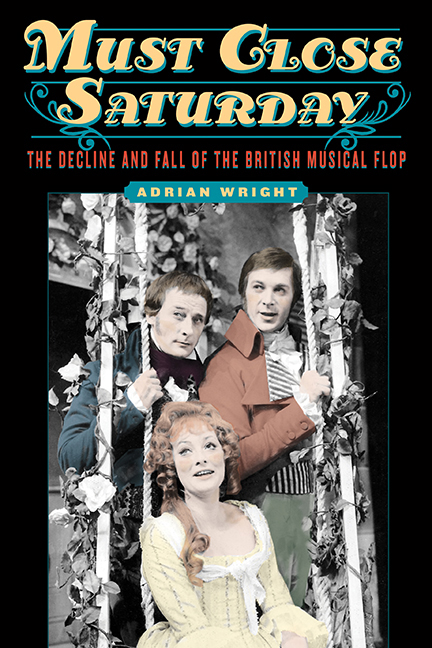Book contents
- Frontmatter
- Contents
- List of Illustrations
- Preface and Acknowledgements
- 1960
- 1961–1964
- 1965–1966
- 1967–1969
- 1970–1972
- 1973–1976
- 1977–1979
- 1980–1983
- 1984–1989
- 1990–1999
- 2000–2005
- 2006–2016
- Appendix: British Musical Flops in London 1960–2016
- Notes to the Text
- Select Bibliography
- Index of Musical Works
- General Index
- Frontmatter
- Contents
- List of Illustrations
- Preface and Acknowledgements
- 1960
- 1961–1964
- 1965–1966
- 1967–1969
- 1970–1972
- 1973–1976
- 1977–1979
- 1980–1983
- 1984–1989
- 1990–1999
- 2000–2005
- 2006–2016
- Appendix: British Musical Flops in London 1960–2016
- Notes to the Text
- Select Bibliography
- Index of Musical Works
- General Index
Summary
‘Even those in the stalls couldn't take it’
Daily Mail on Call It Love?1960: The Lily White Boys The Dancing Heiress Follow That Girl Johnny the Priest The Golden Touch Call It Love? Innocent as Hell Joie de Vivre The Princess Mr Burke M.P. Hooray for Daisy!
In what by its very nature may be an increasingly dispiriting discussion of the fate of the British musical we can at least breathe a communal sigh of relief that it begins with one of the most unusual and inventive of its year, of its decade, of the last sixty years. This means that very few of the British public will ever have heard of The Lily White Boys (Royal Court Theatre, 27 January 1960; 45). Perhaps the Royal Court, so often labelled as the bastion of what might be called ‘New Wave’ drama, once wore a more jolly face. For a time, that now lost and largely forgotten art, intimate revue, rooted and thrived there. In 1955, the Royal Court even hazarded one of the most essentially British musicals of the period, concerning a music festival in a coastal town that could only have been meant as Aldeburgh, the spiritual home of Benjamin Britten. The Burning Boat made several stops along the road to perfection, although some of Geoffrey Wright's sinuous score deserves to be remembered; ‘Swimming Against the Tide’ and ‘A Quiet Part of the World’ have scarcely been bettered for songs of their type, but their type, lightweight British pastoral, has long been consigned to oblivion. There is certainly nothing ‘New Wave’ about The Burning Boat, where emotional reticence keeps its characters, music book and lyrics well short of the sort of explosive emotionalism that has all but engulfed the British musical. Five years later, The Lily White Boys pointed a way forward (yet another way forward) for a genre that generally attracted critical disregard and public apathy. Wasn't it time that the British musical grew up? Wasn't the fact that this new sort of musical had a distinguished director in Lindsay Anderson, and sets by a man fast becoming the titan of West End scenic design, Sean Kenny? Plus Albert Finney, on the verge of forever establishing his working-class credentials with the film of Saturday Night and Sunday Morning, in his only stage musical.
- Type
- Chapter
- Information
- Must Close SaturdayThe Decline and Fall of the British Musical Flop, pp. 1 - 20Publisher: Boydell & BrewerPrint publication year: 2017

